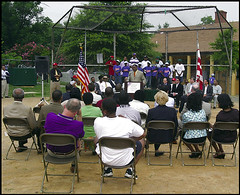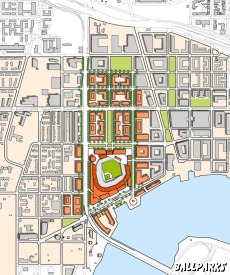Why it's hard to build coalitions on issues, thoughts on baseball
 Susan Biddle/The Washington Post. DC Council members Marion Barry, Kwame Brown, Vince Orange, former council member Frank Smith with Jon Ledecky and co - bidders for Washington Nationals, the Hidary's. They gathered on baseball diamond outside Barry Farm Recreational Center in SE Washington.
Susan Biddle/The Washington Post. DC Council members Marion Barry, Kwame Brown, Vince Orange, former council member Frank Smith with Jon Ledecky and co - bidders for Washington Nationals, the Hidary's. They gathered on baseball diamond outside Barry Farm Recreational Center in SE Washington.Because everyone has a different angle.
Take baseball for instance. Many people believe that, based on the research and evidence, that sports stadia aren't very good public investments. Mattwdc's blog entry about this, discusses how tough it is for him, as a rabid baseball fan, because it's not a very good deal for citizens, and it sure doesn't help many people given the other kinds of areas where the city needs to be focused (schools, libraries, parks, affordable housing, entrepreneurial retail, etc.).

On the other hand, an email on a local e-list almost convinced me to let this slide because after all most of the money comes from additional taxes that would not likely have been imposed. (OTOH, the argument is such tax streams need to be created and utilized carefully, for things that really matter, and baseball stadiums don't really matter when it comes down to it in turns of creating a great quality of life in a city.)
I think that most people are probably happy about having baseball back in the city, for people that want to go see it, and I do have to agree that on Fridays-Sundays for sure, it does make a difference for area businesses. (The other nights of the week people tend not to go out after the game because they have to work the next day.)
But I think that at the same time, most citizens don't favor giving to the rich, to get even richer (I am particularly pissed off at how MLB, through Congress, prevented DC from being able to tax visiting ballplayers, which is something that most jurisdictions do across the country--pioneered by California naturally). I think a couple players might live in the city, but most don't.

 Who are these people? Note the Virginia license plate.
Who are these people? Note the Virginia license plate. Washington Nationals officials grab a protestor prior to a ceremony unveiling the new team logo and name for the 'Washington Nationals.' Larry Downing / Reuters.
Washington Nationals officials grab a protestor prior to a ceremony unveiling the new team logo and name for the 'Washington Nationals.' Larry Downing / Reuters.Among others, the DC Fiscal Policy Institute has done great work on this issue; DC Watch as always. Also, there is a stupendous article about "Eminent Domain Revisited" in Gotham Gazette, primarily about sports-related takings in NYC.
Anyway, because of my involvement in anti-Walmart stuff, I ended up on the e-letter list for the Metro AFL-CIO council, and this is what I received in the email box today:
On Tuesday the DC City Council will vote on whether to approve the Anacostia Waterfront Ballpark. DC workers and residents stand to lose jobs and economic development if the Ballpark is not approved. Please click here to urge City Council to approve the Ballpark.
Without the Ballpark, District workers and residents could lose the development engine to make major improvements on the Anacostia Waterfront and to support the Community Benefit Fund: a stadium at the RFK site will not create the jobs and economic growth of the current plan.
 From www.ballparks.com.
From www.ballparks.com.Building the Anacostia Waterfront Ballpark is an investment in the future, not only creating billions in development, but thousands of construction and permanent jobs for District residents. Please click here now to urge City Council to approve the Ballpark.
________________
Unions focus on job development. That's what they are supposed to focus on. But when the jobs come at great cost, or at the expense of other jobs-development activities, that's something we need to pay attention to.
Index keywords: baseball; community-organizing



0 Comments:
Post a Comment
<< Home